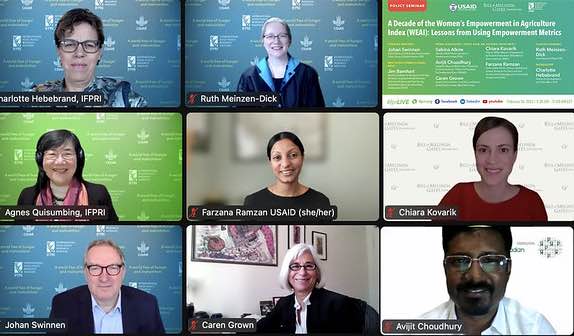Since its launch in 2012, IFPRI’s Women’s Empowerment in Agriculture Index (WEAI) has been used by over 230 organizations across 58 countries to track progress in empowerment and gender equality. A Feb. 16 IFPRI event marked the WEAI’s 10th anniversary, focusing on lessons learned over the past decade and potential paths going forward.
In particular, WEAI will be an essential tool as the COVID-19 pandemic and climate change impacts continue to exacerbate gender disparities in agriculture and food systems, IFPRI Director General Johan Swinnen said in his opening remarks. The WEAI family of tools can help to pinpoint such disparities and evaluate the effectiveness of strategies that increase women’s empowerment, helping in efforts to build equitable systems as the world continues to change, he said.
What is WEAI? How did it start and evolve?
Ten years ago, the U.S. Agency for International Development (USAID) was actively aiming to include more women in its programming, especially Feed the Future, said Jim Barnhart, Feed the Future’s Deputy Coordinator for Development. Assessing this process required a new tool, and USAID approached IFPRI and the Oxford Poverty and Human Development Initiative (OPHI), which developed WEAI.
The original WEAI is a survey-based tool that measures the inclusion of women in the agricultural sector, explained IFPRI Senior Research Fellow Agnes Quisumbing. It was designed to look at both sole and joint household decision-making and control over livelihoods, resources, and income, mostly in agriculture, and in population-based surveys of both women and men. Since then, WEAI has grown into a suite of quantitative and qualitative tools to meet increasing and novel demands on investigating women’s empowerment.
Now included is an abbreviated version (A-WEAI); a version for impact assessments of agricultural development projects that include additional aspects of empowerment (pro-WEAI); optional add-ons for nutrition and/or livestock-oriented projects; and a version for projects focusing on market inclusion (pro-WEAI + market inclusion, formerly WEAI4VC). The qualitative protocols have been used in many settings, offering insights into how women and men understand empowerment, how empowerment strategies are perceived, and more. Finally, there’s an interactive tool that helps prospective users determine which WEAI they should choose for their project needs.
What sustains WEAI’s wide use and momentum?
OPHI Director Sabina Alkire credited various factors—offering open-source resources, involving key stakeholders, sharing success stories, and more—with WEAI’s wide uptake. For instance, the WEAI team has hosted countless trainings and capacity building workshops over the years. In 2018, the WEAI Resource Center launched a website with overviews of each version of the index, provides implementation guides and instruments, and compiles WEAI-related publications and blogs. Additionally, a distance learning course launched in 2021 offers prospective users the opportunity to master WEAI fundamentals (in English or French, with Arabic and Spanish versions forthcoming). Stakeholder involvement was—and remains—key to WEAI’s success. The WEAI team has consistently engaged non-technical policymakers to ensure they understand its purpose and can effectively use the index in implementing policies, Alkire said. The methodology “engages the protagonists” by focusing on the agency of women and poor people, she said, affirming them as key pillars of meaningful and long-lasting change.
Some WEAI success stories
In Ethiopia, a WEAI analysis found that women’s lack of access to and control over household resources, disproportionately greater time burden, and weaker social networks relative to men were barriers to improved nutritional outcomes, said USAID Senior Gender Advisor Farzana Ramzan. In response, the Ethiopian government developed and implemented new strategies that aim to increase women’s participation in and control over economic activities for their national nutrition program. Elsewhere in Africa, President Nana Akufo-Addo of Ghana has said the government aims to increase the country’s WEAI score by 20%, and the Comprehensive Africa Agriculture Development Programme (CAADP) draws on WEAI for its gender equality indicators.
In Asia, Professional Assistance for Development Action (PRADAN) programming in India and the Agriculture, Nutrition, and Gender Linkages (ANGeL) program in Bangladesh are WEAI successes. Avijit Choudhury, PRADAN Integrator, explained how WEAI data helped PRADAN take empowerment from an abstraction to concrete actions easily recognizable by the communities they serve, starting a dialogue about what strategies best empower women. PRADAN has since shifted from a sole focus on self-help groups to supporting women’s participation in farming cooperatives. This strategy has notably increased women’s empowerment; for instance, women have gained influence in choosing which crops to produce, and seen greater income from their sale.
Having nationally representative data on empowerment to inform programs and policy is crucial, said Akhter Ahmed, Country Representative for IFPRI Bangladesh, and WEAI has played an important role in such efforts. As he recounted, the 2011-2012 Bangladesh Integrated Household Survey (BIHS) marked the first time a WEAI module was fielded in a national survey. The WEAI findings from BIHS showed that women’s empowerment improved agricultural diversity, nutrition, and poverty outcomes. These findings were used to design ANGeL, a three-year pilot project to identify strategies in agriculture that could enhance nutrition and women’s empowerment. An impact evaluation of ANGeL found that it empowered women without disempowering men. The project also increased nutrition knowledge and adoption of improved agricultural production practices. In response to these successes, the Ministry of Agriculture of Bangladesh decided to scale the ANGeL program nationally.
Future plans
Pro-WEAI and pro-WEAI+MI are still being tweaked; any updates will be posted on the WEAI Resource Center. We plan to release distance learning modules about fieldwork implementation and qualitative pro-WEAI approaches in the near future, so be sure to check the course platform periodically.
The WEAI team thanks USAID, the Bill & Melinda Gates Foundation (BMGF), Millennium Challenge Corporation (MCC), Deutsche Gesellschaft für Internationale Zusammenarbeit (GIZ), the Walmart Foundation, and the IFPRI-led CGIAR Research Programs on Agriculture for Nutrition and Health (A4NH), and on Policies, Institutions, and Markets (PIM) for their support over the past decade. Here’s to the next ten years and beyond!
Emily Myers is a Research Analyst with IFPRI’s Poverty, Health, and Nutrition Division.







